While 2023 proved tumultuous for a movie industry grappling with striking actors and writers, the existential threat of A.I. and shrinking box office for once sure-thing blockbusters, it turned out to be a very good year for moviegoers, who were treated to socially observant megahits (Barbie), challenging, adult-level entertainments (Oppenheimer) and terrific, smaller films satisfying both audiences and critics (Past Lives).
In a year of so many superb movies, ranking a “ten best” list feels both agonizing and futile given the number of memorable works that could easily comprise a second top ten tally. After more deliberation than perhaps any prior year, these were the ten best movies of 2023 (but 11-20 are equally deserving).

1. Oppenheimer
In took me two rigorous viewings to appreciate the accomplishment of Christopher Nolan’s densely sprawling treatise on nuclear ethics, charting the race to build the atomic bomb and later, the personal fallout for J. Robert Oppenheimer, the “American Prometheus” who led The Manhattan Project and whose fog of war conscience was indelibly depicted by a never-better Cillian Murphy. A feat of time-hopping storytelling from the development of Fat Man and Little Boy to their inventor’s haunted, post-war gravitas, his FBI security clearance revocation hearing via communist scapegoating and atomic energy advisor Lewis Strauss’ (a fine Robert Downey, Jr.) unsuccessful Senate confirmation bid, Nolan’s meaty, men-in-rooms epic was 2023’s finest, most literate and challenging picture. With a superb cast, Herculean assembly and an unapologetically cerebral, lean-in audience mandate, Nolan’s best film posited a serpentine critique of technology and bureaucracy, questioning the responsibility of scientific advancements and their relationship to human decimation with bracing intelligence.

2. Killers of the Flower Moon
In Martin Scorsese’s opus Killers of the Flower Moon, the octogenarian maestro returned, exacting as ever, to his enduring, six-decade career of thematically rich and technically complex canvases, transforming infamy into stunning entertainment. In a picture about whether love and avarice can ever coexist, Scorsese brought signature artistry to a thrilling, large scale movie with moments of unexpected intimacy, a morality play filled with exploiters and their prey populating a shameful, writ large chapter of American history. In his adaptation of David Grann’s 2017 nonfiction book, an exposé of the Oklahoma Osage tribe killings during the early 1920s and the nascent stages of the FBI, Scorsese superbly navigated a labyrinth of ethics, crime and punishment against a backdrop of heartland greed and nefarious family ties. A charismatically villainous Robert DeNiro was joined by the powerful Leonard DiCaprio, embodying an ambivalent character of little intelligence with remarkable complexity and moral opacity, one whose limitations make him an useful idiot in a long-game plot to doom the Osage, including his long-suffering tribal wife, an impressively stoic Lily Gladstone. An American tragedy superbly mounted and performed.

3. Poor Things
A fearlessly absurdist marriage of style and tone, this year’s prize for movie audacity went to Poor Things, Yorgos Lanthimos’ fiercely realized, exuberant provocation, a liberation odyssey starring Emma Stone in a career-high performance as an instantly iconic screen character, one created as a companion for man but whose appetite for self-discovery challenges period conventions and, perhaps, modern movie sensibilities. In one of the year’s best films, both director and actress reached a collaborative creative apex. Adapted from Alasdair Gray’s 1992 romp novel about a deceased Victorian woman resurrected before embarking on a quest for independence, Lanthimos (The Lobster, The Killing of a Sacred Deer, The Favourite) delivered an ingenious, postmodern Pygmalion by way of gender subverted Mary Shelley parable, a feminist Frankenstein informed by a streak of gothic Victorian design and mores. His monster—a ribald young woman who sets about rejecting the constraints of “polite society” in search of personal and sexual fulfillment—afforded Stone the best role of her career, which in a perfect world would net the actress a second, deserved Oscar. Poor Things was the year’s most daring, loaded with visual ingenuity, terrific supporting turns and a screenplay so insightful about its heroine’s evolution that it became the year’s most joyous movie experience.
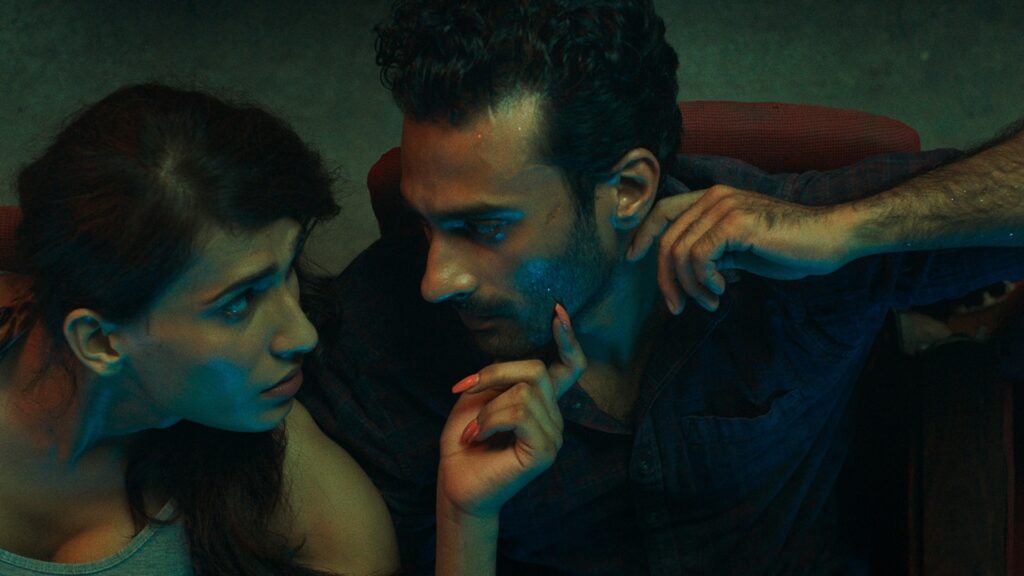
4. Joyland
In Saim Sadiq’s Punjab-set Joyland, patriarchal social and familial structures reign in modern-day Pakistan, where an unemployed, lesser-than adult son (Ali Junejo) of a stern, traditional father and alpha model brother finally gets a vocation—as a dancer in an “erotic” club working for a trans entertainer—forcing a self-actualization and family reckoning with devastating repercussions. There’s much more in Sadiq’s heartrending critique of a masculine autocracy that hurts everyone, both women and men, in perpetuity. Controversial and still banned in half of its home country, Joyland presents a cohabiting family of men and women—patriarch, sons and their wives and children, forging toward modernity but bound by traditions that will lead to disaster. Equal parts individual, family and love story, Sadiq’s intricate screenplay presents a half-dozen fully developed characters worthy of their own films, including a progressive yet trapped wife (Rasti Farooq) and a goal-oriented trans entertainer (Alina Khan) pursuing a dream while making ends meet with in a world of aggressive men. Colorful, romantic and devastating, Joyland was the year’s best international film.

5. Past Lives
Can true love overcome the stark differences between the stages of our lives and the roles we assume, or is it destined to remain frozen in time as we become new people? Celine Song’s Past Lives, the poignant story of adolescent soul mates suspended across decades and continents, was a contemplation of such things, a tender picture about feelings and destinies and an accomplished first feature that was decidedly low key until its emotional final act. In its tale of a driven, married New York playwright and Korean immigrant (Greta Lee) contending with a long-time connection to a childhood friend (the sensational Tea Too) while pursuing her ambitious career and navigating her sensitive husband (the equally sensational John Magaro), Song crafted a delicate meditation on cultural and personal identities and romantic longing. Past Lives directly embraced matters of the heart and nuances of human relationships with impressive sophistication and without a trace of melodrama. Additionally, the filmmaker offered a thoughtful rumination on immigrant dreams and reconciliations, introducing us to a trio of empathetic characters with serious regard for the consequences of their feelings.

6. Dream Scenario
Nicolas Cage continued his hot streak comeback with one of his very best performances in the clever, structurally innovative Dream Scenario, about an everyman schlub who gets the chance, for one brief moment, to be exceptional. Written and directed by gifted Norwegian filmmaker Kristoffer Borgli (Sick of Myself), the ambitious comedy-drama-satire-fantasy-thriller took on our fascination with making instant viral stars—the cynical packaging, meteoric rise to fame and too-short fifteen minutes—and dropped this fleeting phenomenon at the feet of a disappointed everyman. Across this culturally on target material Cage, as a middle-aged, Average Joe college professor of little distinction who enters our collective unconscious to become both beloved and reviled, was given full autonomy to deploy his gifted versatility as a character emboldened by a reversal of fortune and then pained by ruin. The Oscar-winning actor, who effortlessly moves from A-list to B-grade pictures while investing each with full conviction, gave one of the year’s smartest, most unique performances. Borgli’s rebuke of celebrity and a fickle culture that makes and breaks lives was clear, as was his assessment that the allure of fame necessitates fragile, false identities which court disaster.
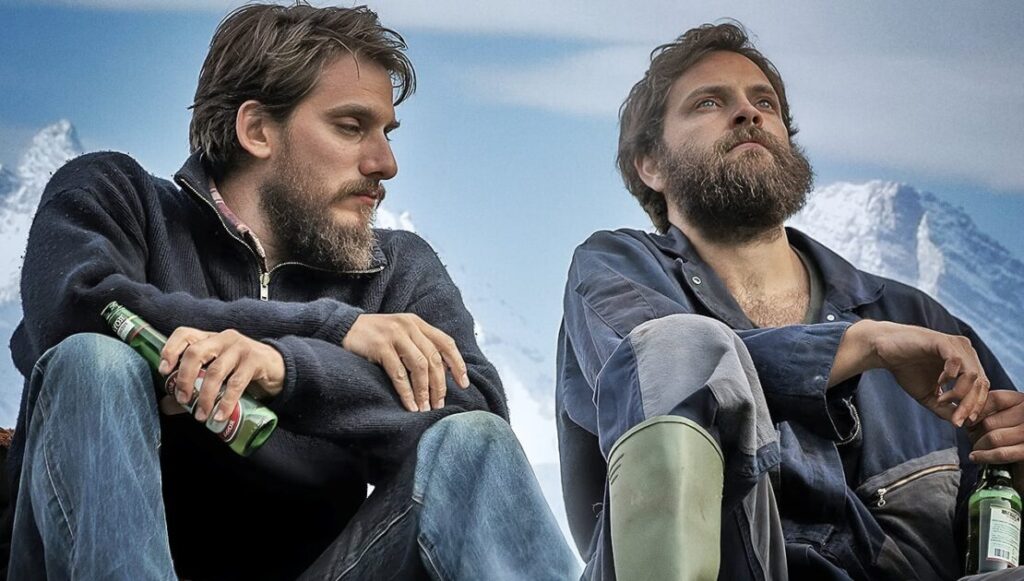
7. The Eight Mountains
In their sweeping story of male friendship, filmmakers Felix van Groningen (The Broken Circle Breakdown) and Charlotte Vandermeersch crafted a gorgeously shot picture of immense spirt and sadness. Based on the 2016 novel by Paolo Cognetti, The Eight Mountains was an epic of camaraderie and companionship between a pair of Italian youths who become men; as their lives twist in different directions, their bond remains steadfast. Filmed in 1.33:1, the square “Academy” ratio capturing the Italian Alps (the format accommodates maximum mountain peaks), the picture recalled Bernardo Bertolucci’s 1900 (Novocento) in its examination of two boys on opposite sides of a class divide and the chance encounter that will shape their lives, meeting as children to roam the mountain rivers and forests in idyllic suspension. As adults the same characters are beautifully played by Luca Marinelli (Martin Eden) and Alessandro Borghi, one worldly, privileged and living in Nepal as a writer while the other a mountain man and farmer who will never leave his Alpine home. Adulthood intervenes to separate them and their continued attempts to rebuild their childhood bond, including constructing a home on their favorite mountain plateau, are the stuff of novelistic gravitas. A paen to the heights of childhood, The Eight Mountains contemplates nature and urbanity, masculinity, the disappointments of adulthood, fraternal love, fathers and sons.

8. Palm Trees and Power Lines
In one of the most unsettling movies in memory, first-time filmmaker Jamie Dack’s Sundance winning, blunt force Palm Trees and Power Lines, about a slow-burn relationship between a vulnerable seventeen-year-old Californian girl (Lily McInerny) on summer break and her manipulative thirty-four-year-old suitor (Jonathan Tucker), was a difficult to describe picture in that it obscured a certain agenda for both the audience and its unsuspecting young heroine. In a partially autobiographical premise, Dack pulled no punches in her demonic view of a calculating predator systematically demolishing his prey, eradicating a young woman’s ability to discern right from wrong and, in the sobering final scene, her sense of self-worth. While it will not be for everyone, this highly distressing examination of trust, dependency and exploitation was a knockout indie drama. Palm Trees and Power Lines was upsetting—and unmissable.

9. The Teachers’ Lounge
A popular new junior high school teacher endures an escalating a gauntlet of suspicion in filmmaker Ilker Catak’s The Teachers’ Lounge, a high anxiety German drama posing questions about the right to privacy for students and faculty in an academic setting and professional and personal ruination without due process or evidence. In a stunning performance, Leonie Benesch (The White Ribbon) is a progressive teacher whose methods inspire her pupils, whom she protects from a radical administrative inquisition—which includes racial profiling—over a rash of thefts. Suspecting a faculty member the culprit, she sets up a recording device in the teacher’s lounge, the results of which tear both the faculty and student body apart, notably an emotional adolescent (Leonard Stettnisch) caught in the middle. Structured with the propulsion of a thriller for a taut 90 minutes, the picture was less about solving the crimes at hand and more a frightening look at “cancel culture” in the pursuit of an elusive, objective truth. A knockout scene set during a parent-teacher conference was amongst the year’s most gripping, and Benesch was as good as any of this year’s Oscar hopefuls.

10. Full Time
A French social realist drama as exciting as the movies have seen in ages, riveting Full Time found a harried, single working mother (Laure Calamy) hanging by a thread—professionally, maternally and financially—over the course of a few stressful days, navigating an avalanche of bad luck while trying mightily to keep all balls in the air and secure a new job. In an unusual amalgam—think Ken Loach economic realities by way of the beat-the-clock intensity of Run Lola Run—filmmaker Eric Gravel delivered a high-stakes story with an empathetic character moving at a breakneck pace, here a Parisian hotel chambermaid (Calamy) contending with a transit strike threatening her livelihood. Scored to the throbbing synth beats of French electronic artist Irène Drésel, Full Time took off like a shot and never flagged, a metaphor for a life in constant motion despite escalating odds. This balancing act, as the camera moved, darted, followed, sped up and threatened to exhaust us as did its heroine, was razor sharp in both lensing and editing, producing a tension few films can match. A fast-paced, hypnotic trek to survival, Gravel’s tale and style tightened like a vice. Throughout, Calamy’s moment-to-moment focus was a testament to fortitude and sacrifices of all working class single mothers.
11. All of Us Strangers
12. Barbie
13. Mission Impossible: Dead Reckoning Part I
14. American Fiction
15. Pacifiction
16. Sisu
17. The Blue Caftan
18. Guy Ritchie’s The Covenant
19. Passages
20. Bottoms

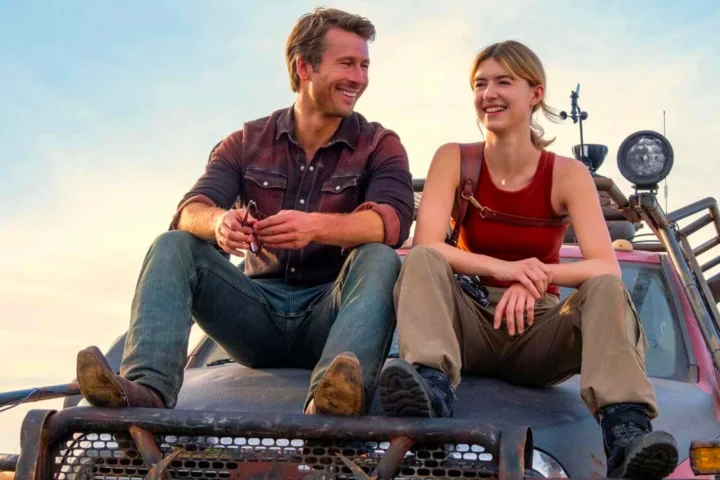
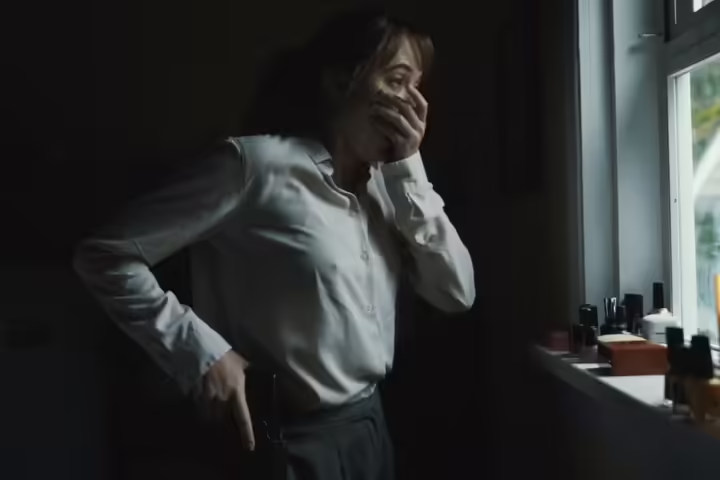
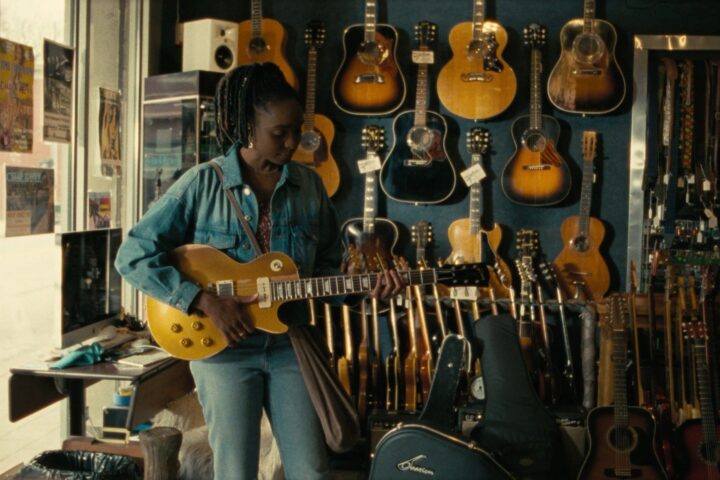
I love that SISU made the list. I missed it in theaters, but can’t wait to catch it on the small screen
Hey Christian! SISU is terrific; pure cinema and every bit the movie that John Wick: Chapter 4 was not (although I hate to make comparisons such as this one). Expertly shot, very exciting, keeps topping itself and has a fantastic lead performance without a word spoken until the final scene.
Hope you are well and let’s connect in email about HM, etc.
Enjoyed reading your wrap-up, Lee. Glad to see a few movies I have not heard much about and a couple I have not heard of at all. The happens a little more since I got out of the “critic’s game,” but I like to see this apples-and-oranges exercise used to highlight lesser-seen work. I still engage in this exercise (mainly as a New Year’s Eve tradition shared with my wife), but I now include first views of older films and high-end TV (which is cinema), so it’s too messy for any practical purpose! Per 2023 releases on your list, I part hard with you on “Oppenheimer” (haven’t really loved a Nolan film since “The Prestige”) and didn’t think much of “Dream Scenario,” but we are on the same page with “Poor Things” (my #1) and “Past Lives” (also my #5). I admire much of “Killers of the Flower Moon” (#14), but with some reservations. I’ll see it again for sure, though. I’m also a fan of “Barbie” (though overhyped, of course), “M:I: Dead Reckoning,” “American Fiction” and “Sisu.” Were “The Holdovers,” “Godzilla Minus One,” Fincher’s “The Killer” or “Broker” anywhere close to making your list? All in my top 10. “Godzilla Minus One” got everything right that all these bloated American, FX-overloaded franchise films get wrong. Adored it. Anyway, best to you in 2024.
Hey Joel- Great to get your note here. I recall our exchange on Oppenheimer last summer. After seeing the film an additional time I revised my view (though left my initial review as it was) but well remember where we both were coming from in our reservations, which are all valid. Glad you enjoyed the list this year! I’m still considering revising again as ALL OF US STRANGERS belongs much higher than #11. But what to remove? Good year for films! On your questions:
LOVED The Killer; it was initially in my top 20 tally and somehow was bumped out.
The Holdovers is such a lovely film. I’ve seen it twice and admire it quite a bit. Would have made very close and perhaps if I saw it again it could squeeze in!
Godzilla Minus One didn’t thrill me although I appreciated the technical achievement (but how exactly did Godzilla seem to stand in the middle of the ocean?). Well made, perfectly shot, fun stuff. I didn’t love the histrionics in some of the performances and the personal story did not quite get me, which is why I did not include.
I liked Broker quite a bit; I categorized it as 2022 as it was technically released then, and did a series of talks on it earlier this year. Not quite at the level of Kore-eda’s Shoplifters but with strong merits.
I would love to see your list: [email protected].